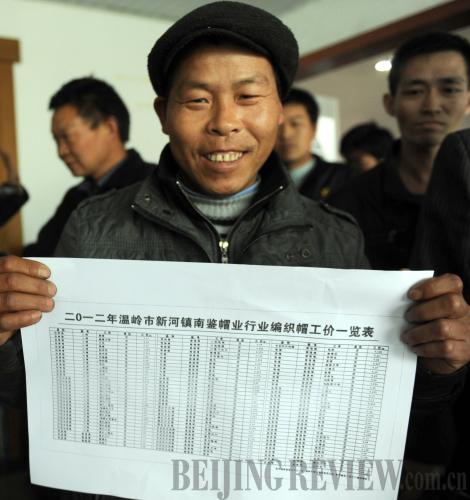|
 |
|
OUTCOME: A worker at a cap-making enterprise in Nanjian Village in Wenling, Zhejiang Province, shows new wage standards reached in April 2012 (WANG DING) |
Wang Bing has worked as a wedding dress photographer for more than 10 years in Beijing's Xicheng District. He said he happily accepted an invitation to attend a consultation on wage standards in his industry held by the district's Federation of Trade Unions in the summer of 2012.
Wang commented that those working in the wedding dress photography industry lack the stability provided by salary standards and the unstable turnover of employees makes many feel there is no security. "We didn't expect this problem to be solved in the short term," Wang said.
Wang and more than 1,000 other employees from over 40 wedding photography companies were at the meeting. They expressed their demands and voted for a wage standard setting. "I was surprised," Wang said. "Before that, my boss was the only person that had any say over my wage."
"We are glad to see that employees can benefit from wage negotiations," said 58-year-old Xin Daxiong, one of the wage negotiators from the Xicheng District Federation of Trade Unions who later represented Wang and other participants at the meeting.
The negotiators are tasked with regulating the wage system in relatively chaotic industries. Sometimes, they take action before appeals are even made.
Xin and many of his coworkers are retirees from trade union organizations at different levels and have many years of experience in dealing with disputes between employers and employees.
"It is not an easy task to make the employers and employees from all the many companies sit together and discuss wage adjustments, but we make sure the result benefits everyone," Xin said.
The collective wage negotiation system was introduced in China in the early 1990s, although it has not been a widespread practice until recent years, with the number of labor disputes having been on the rise. Li Shouzhen, a spokesman for the All-China Federation of Trade Unions (ACFTU), said that low pay and the slow pace of wage rises are to blame.
China's Trade Union Law stipulates that unions can sign collective contracts and conduct wage negotiations with employers on behalf of employees. In 2011, the ACFTU made a plan to introduce collective wage negotiations to all enterprises to reduce labor disputes.
"Collective wage negotiations have led to the establishment of a reliable wage increase mechanism in some places," said Zhang Jianguo, head of the Collective Contract Department of the ACFTU. "Wages of employees in enterprises that adopt the system are 10 percent to 15 percent higher than their counterparts without its protection."
In Wuxi, east China's Jiangsu Province, for example, workers' wages have grown by 5 percent to 10 percent annually in recent years after collective wage negotiations were adopted in the late 2000s. Adoption of the system has also resulted in a yearly wage increase ranging from 10 to 22 percent for local enterprise employees in Tianjin's Hedong District.
"It is not just the employees that benefit from it—the employers gradually realize that collective bargaining helps improve labor relations," Zhang noted.
| 